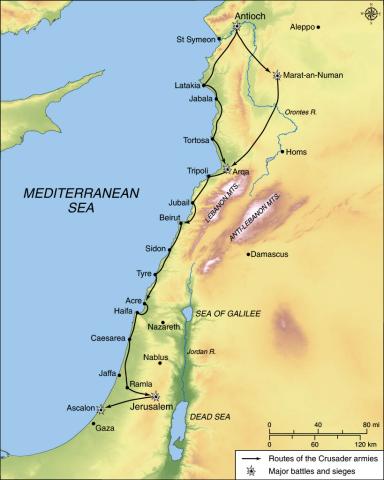The Battle of Ascalon
[10.39.9] Veniēns itaque ammiralius ante cīvitātem, dolēns et maerēns, lacrimandō dīxit: “Ō deōrum spīritūs, quis umquam vīdit vel audīvit tālia? Tanta potestās, tanta virtus, tanta mīlitia quae numquam ab ūllā gente fuit superāta: modo ā tantillā gente Chrīstiānōrum est dēvicta! Heu mihi, trīstis ac dolēns, quid amplius dīcam? Superātus sum ā gente mendīcā, inermī, et pauperrimā; quae nōn habet nisi saccum et pēram. Ipsa modo persequitur gentem Aegyptiacam, quae illī plērumque suās largīta est eleemosynās, dum ōlim per omnem nostram patriam mendīcārent. Hūc condūxī, ad conventiōnem, ducenta milia mīlitum, et videō ipsōs laxīs frēnīs fugientēs per viam Babylōnicam, et nōn audent revertī adversus gentem Francigēnam. Iūrō per Machumet et per omnia deōrum nūmina, quod ulterius nōn retinēbō mīlitēs conventiōne aliquā, quia expulsus sum ā gente advenā. Condūxī omnia armōrum genera et omnia māchināmenta, ut eōs obsīderem in Hierusalem, et ipsī praevēnērunt mē ad bellum itinere diērum duōrum. Heu mihi, quid amplius dīcam? Inhonōrātus erō semper in terrā Babylōnicā.”
notes
(August 1099) The Fatimid general, the vizier al-Afdal, bemoans his defeat.
ante cīvitātem: “before the city,” i.e., he went to Ascalon.
quae nōn habet nisi saccum et pēram: bags and satchels were characteristic of pilgrims, who would beg for food. Presumably al-Afdal is portrayed as sarcastically exaggerating the weakness of the crusader army.
Ipsa modo persequitur gentem Aegyptiacam: = ipsa (gēns Christiāna) modo persquitur gentem Aegyptiacam.
quae illī plērumque suās largīta est eleemosynās: = quae (gēns Aegypticiam) largīta est eleemosynās illī (gentī Christiānae).
dum ōlim per omnem nostram patriam mendīcārent: earlier Christian pilgrims (says al-Afdal) had been supported by the charity of the moslems.
ad conventiōnem: “to battle.”
laxīs frēnīs: “with reins loosened,” i.e., in a hurry, in a panic.
per Machumet et per omnia deōrum nūmina: as before, our author assumes that Moslems are polytheists.
quod ulterius nōn retinēbō mīlitēs conventiōne aliquā: “that I will in the future not keep soldiers in any battle"; he is done with war.
ipsī praevēnērunt mē ad bellum: “it is they who have attacked me” (Hill).
itinere diērum duōrum: “(at a distance of) a journey of two days.”
in terrā Babylōnicā: i.e., in Egypt, as always in this text.
vocabulary
maereō (2): to be sad; to mourn, to grieve
tantillus –a –um: so little, so small
mendicus –a –um: beggarly, needy; (ML) of a beggar
inermis –e: defenceless
saccus –ī, m.: a sack, bag
pēra –ae, f.: a bag, wallet
plērumque: for the most party, generally
largior (4): (dep.) to lavish, bestow
eleemosyna –ae, f.: charity, alms (LL)
conventiō –ōnis, f.: a coming together, meeting; (ML) battle
laxus –a –um: yielding, loose
frēnum –ī, n.: a bridle, curb, bit
advēna –ae, m./ f./ n.: stranger (noun and adjective)
praeveniō praevenīre praevēnī praeventum: to anticipate; to surpass

